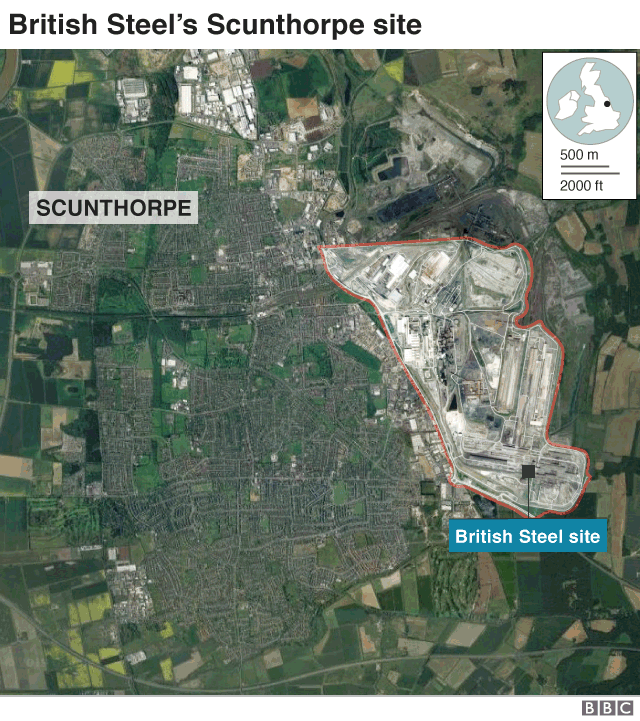The future of 5,000 British Steel workers remains uncertain as its owners continue to lobby for government backing.
The UK’s second-biggest steel maker had been trying to secure £75m in financial support to help it to address “Brexit-related issues”.
If the firm does not get the money it would put 5,000 jobs at risk and endanger 20,000 in the supply chain.
Labour has urged the government to nationalise British Steel.
But Treasury sources say the only way nationalisation would be contemplated is if there were credible buyers waiting in the wings.
And – says BBC business editor Simon Jack – “there are no clear candidates to buy a weak company in a challenged sector”.
The company’s request for emergency support from the government is understood to have been reduced from £75m to about £30m.
In April, British Steel borrowed £100m from the government to enable it to pay an EU carbon bill, so it could avoid a steep fine.
The government said it would leave “no stone unturned” in its support for the steel industry. British Steel’s main plant is at Scunthorpe, but it also has a site in Teesside.


According to think-tank IPPR, allowing British Steel to collapse would lead to £2.8bn in lost wages over a 10-year period and cost the government £1.1bn in lost revenue and extra benefit payments.
Such a decision would also reduce household spending by £1.2bn, which would have an impact on the economy.
IPPR’s chief economist Carys Roberts said: “We need a UK-wide industrial strategy that supports strong supply chains, including the foundation industries such as steelmaking that manufacture core materials for use in other industries.”
Last Thursday, British Steel said it had the backing of shareholders and lenders and that operations were continuing as usual while it sought a “permanent solution” from the government to its financial troubles.
It is understood that along with administration, nationalisation or a management buyout are being discussed as fall-back options for the company.
British Steel’s troubles have been linked to a slump in orders from European customers due to uncertainty over the Brexit process.
The firm has also been struggling with the weakness of the pound since the EU referendum in June 2016 and the escalating trade US-China trade war.
One of its biggest customers is Network Rail, 95% of whose rails are supplied by British Steel’s Scunthorpe plant.
In 2007, India’s Tata conglomerate entered the UK steel market when it bought the Anglo-Dutch group, Corus. In 2010, the business was renamed Tata Steel Europe.
After a difficult few years, Tata sold the Scunthorpe long products division to private equity firm Greybull Capital for a nominal £1.
Greybull’s rescue came during the depths of the steel crisis in 2016 and saved more than 4,000 jobs.
It then rebranded the company as British Steel and recently returned it to profit.



2 Comments